by Ivary & Paola | Mar 13, 2020 | 4th/5th Grade News
History & Geography
HISTORY AND GEOGRAPHY – Early Russia
- Russia’s Beginnings
- The Mongol Invasion
- Ivan the Great
- Ivan the Terrible
- Peter the Great
- Catherine the Great
Mathematics
MATHEMATICS – Multiplying and Dividing Decimals
- Dividing decimals
- Dividing by tens, hundreds and thousands
- Estimating sums, differences, products and quotients with decimal
- Math Bingo: with division and decimals
- Celebration of Pi Day (one day early) with song and activity, including the 2/3 class.
Lectura
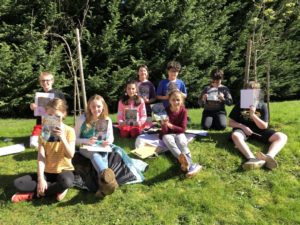
Club de lectores La llamada de la selva.
Dear families, that was a full week!
This week we went over the results of our assessments and continued with our literacy routines. Our spelling work this week focused on the letter h in the middle of a word, and during grammar studies, we worked on the use of prepositions. We were so excited to start our new literature circle, La llamada de la selva. We also continued to work on our school play, Cómo domar al monstruo de plástico.
I cannot tell you how disappointed students were to find out school was going to be closed for a couple weeks. We all love school so much! They were all so mature and understanding, and as a class we put together a plan. Please stay tuned as I will be updating assignments regularly. Families can work and develop a homework schedule that best fits their needs. However, I believe continuing with a routine that is similar to what we do in school would be highly beneficial. I suggest families to devote time for Spanish work everyday after “lunch and recess”. The following is the daily schedule (four times a week) and the assignments students have for the next couple weeks.
Horario
- Práctica de ortografía
- Ciencias
- Club de lectores
- Práctica obra de teatro
- Juegos/arte/proyectos en espanol
- Planificadores (I would love for students to record on their planners all their daily work)
-
Continue to practice (and hopefully memorize) our school play. (Due date: No due date)
-
Club de lectores La llamada de la selva. Read one chapter per week and complete notes. (Due date: students are expected to have read their chapter and have their notes completed by Friday every week).
-
Start planning the book club final project that will illustrate understanding of the main ideas of the book. This project is completely open and they can get as creative as they would like. I will be sending more information about this in the next few weeks.(Due date: students will have to submit the final project the first week back in school)
-
Ortografia: One list per week. Practice spelling. Use a dictionary to find the meaning of unknown words. (Due date:submit sentences by Friday every week).
-
Writing: Develop a piece of writing over the time school is out. Students are welcome to email or share their pieces with me so I can help with editing suggestions (Due date: first week back in school).
-
Write maestra Paola or a classmate an email every week.
-
Lectura FOSS. Read and/or listen to one science chapter from our science interactive books every week. Students are welcome to read from past investigations to continue to practice their Spanish fluency. (Due date: do reading and answer questions on their science journals by Friday).
-
Finish reading their little science black and white books.
-
Following the format of previous investigations (think about a focus question), and following the scientific method, develop your own science investigation. Document all stages of your investigation. Share results. Due date: first week back in school.
-
Check google classrooms and emails on a regular basis.
-
Send pictures of the work you do at home so we can share on our newsletter at the end of the week!
-
Please stay connected as I will be keeping you all posted of the development of the organisms we currently have in our classroom.
Students wrote some ideas of meaningful activities they can do every day during their free time. I hope everybody stays busy and most importantly safe. Feel free to reach out should you have any questions or simply to connect and say hi! I will miss you all greatly!
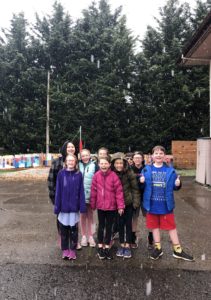
Yes, we saw everything this week! Even snow!
Ciencias
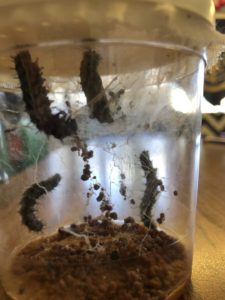
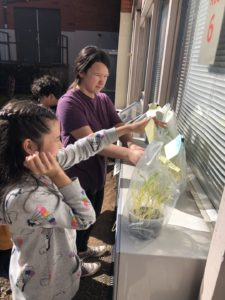
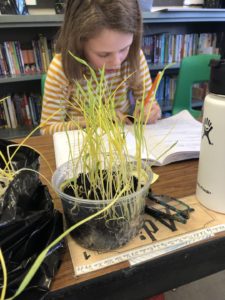
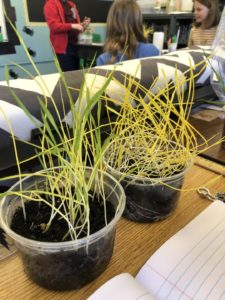
Nutrient Systems :Plant Nutrition and Animal Nutrition
- Chlorophyll is the green pigment that absorbs sunlight in the cells of producer organisms.
- Green plant cells make sugar (nutrients) from carbon dioxide and water in the presence of sunlight, and release oxygen.
- A nutrient is a substance, such as sugar or starch, that is used by a cell to produce the energy needed to perform the functions of life.
- Plants make their own food by photosynthesis. Animals obtain nutrients by eating other organisms.
- Digestion is the process used by animals to break down complex food items into simple nutrients.
Character Education with Dr. Torres
Feelings Identification and Modification:
Kids can have a tough time knowing how to deal with different feelings in appropriate ways. Understanding and appreciating others’ feelings can be difficult, too. This week’s activities focused on helping students identify and deal appropriately with their feelings and their classmates’ feelings. They participated in a game called, “Guess the Feeling,” in which one student picked a card with a feeling listed on it. They then tried to get the class to guess the feeling by expressing it. This activity helped students both recognize different feelings in oneself and others, and provided an opportunity to discuss moments of misperceptions or mis-cueing of feelings (I.e., trying to express sadness, but others’ interpreting it as anger). We also talked about what makes us feel good and created a “Feel Good Journal” as a coping tool.
This class also worked on identifying and discussing how they’d feel if they were involved in a variety of scenarios provided by the teacher. This included:
-Demonstrating the ability to listen to and appreciate classmates’ opinions and feelings
-Practicing reflecting skills to ensure they truly heard and understood the other’s feeling statements.
Objectives:
Through this lesson, students will:
• Comprehend concepts related
to health promotion and disease prevention to enhance health.
• Demonstrate the ability to use interpersonal communication skills to enhance health and avoid or reduce health risks.
• Demonstrate the ability to use decision-making skills to enhance health.
• Demonstrate the ability to advocate for personal, family, and community health.
by Ivary & Paola | Mar 6, 2020 | 4th/5th Grade News
History & Geography
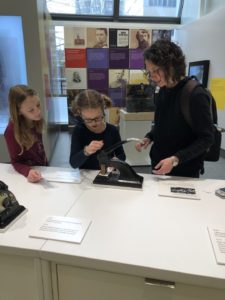
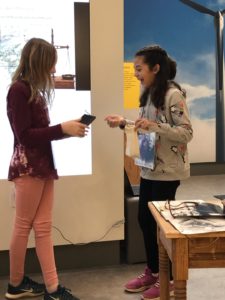
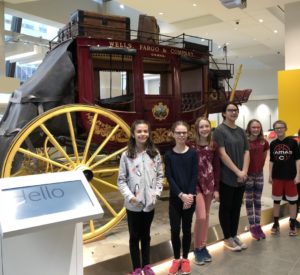
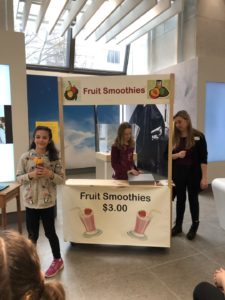
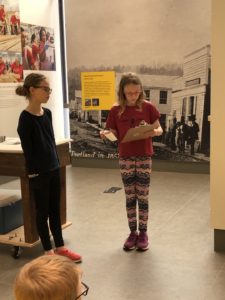
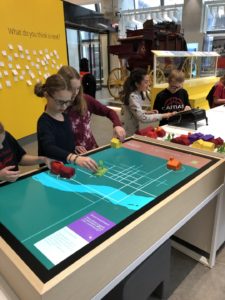
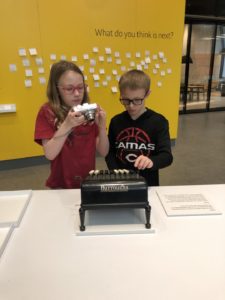
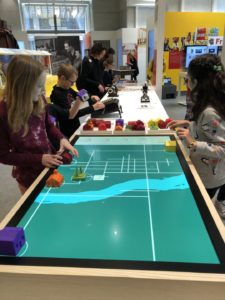
Lectura
This week in Spanish, we spent most of our time working on our science investigations. We did have a chance to do our regular spelling and grammar routines. If your child was absent, they will be taking their spelling quiz on Monday!
Due to having quite a few students out this week, we will be starting our literature studies on Monday.
Obra de teatro: Cómo domar al monstruo de plástico.
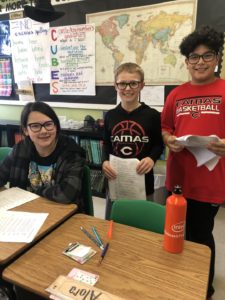
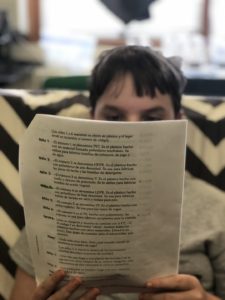
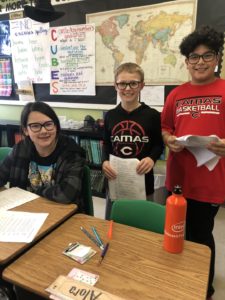
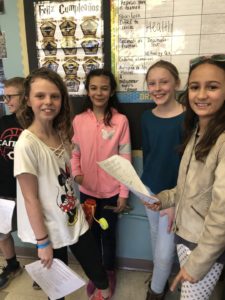
Ciencias
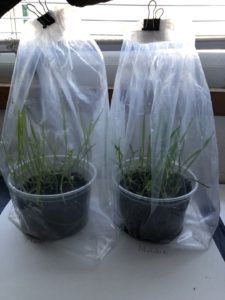
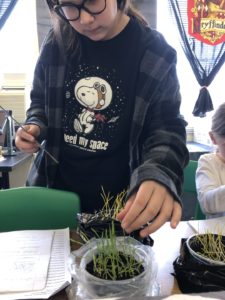
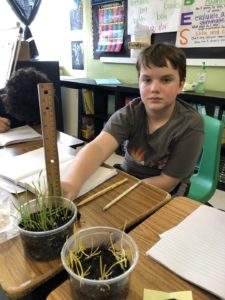
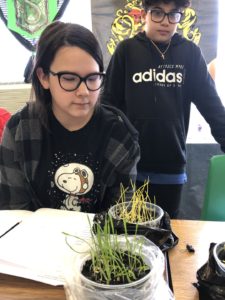
Plant Nutrition
This week we continued with our plant nutrition investigation. Students planted wheat seeds in containers of soil and placed half of the planters in a lighted environment and the other half in a dark environment. Students read about the action of chlorophyll and its role in the manufacture of sugar. After 7 days, they took out and checked the plants to find out if their hypothesis were correct. We wanted to take this investigation one step further, experiment and observe how photosynthesis works! Please ask your child to tell you all about their results!
Animal Nutrition
Students investigated how animals acquire nutrients for their cells by eating and digesting food. We have been observing the growth and changes of another organism – the painted lady butterfly. We are seeing it go through its life cycle. Our larvae have grown so much in the past week and we are excited to see them get into the next developmental stage soon.
The human digestive system was explored through our FOSS reading assignment. If your child was absent, they can access FOSSweb from home and read the chapter El sistema digestivo humano (26 – 27). Students have also been assigned to continue to read their science books, Alimentos y nutrición, up to page 16.
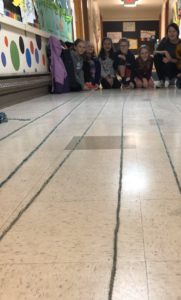
Estudiantes midiendo el largo de su intestino delgado.
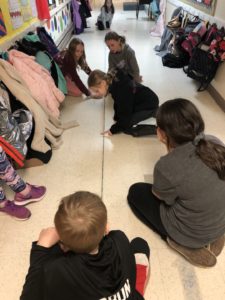
Estudiantes midiendo el largo de su intestino delgado.
by Ivary & Paola | Feb 28, 2020 | 4th/5th Grade News
History & Geography
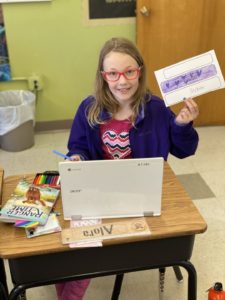 This week we continued to learn about England in the Golden Age. Our objectives were:
This week we continued to learn about England in the Golden Age. Our objectives were:
- Describe Sir Francis Drake’s activities and his importance to Queen Elizabeth and England
- Summarize British exploration during the Elizabethan era, including voyages to North America.
- Summarize the defeat of the Spanish Armada.
- finish reading A Midsummer Night’s Dream, and continue practicing dissecting the language of Shakespeare
Mathematics
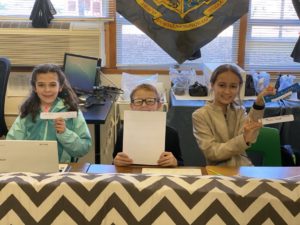 This week we wrapped up our unit on decimals. Our objectives were:
This week we wrapped up our unit on decimals. Our objectives were:
- round decimals to the nearest hundredth
- rewrite decimals as fractions and mixed numbers in simplest form
- demonstrate mastery and understanding of decimals to the thousandth place on the chapter test
Please remind students that their homework is to complete 30 Prodigy questions by Sunday night! I have also offered students a chance to make up missing homework by completing extra Prodigy questions, if needed.
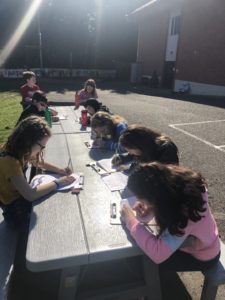
Students taking their end of the unit assessment in the sunshine.
Lectura
Over two days, student took our end of the unit assessment. During this time, students had an opportunity to show their understanding of the spelling, grammar, syntax, reading and writing concepts seen this unit. Everybody has worked really hard – we are all so proud of their efforts!
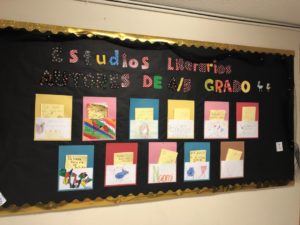
This week we had two full days of Spanish! Please stop by our bulletin board and see our literary studies project: ¨Authors as Mentors¨. This week we studied the work of author and illustrator Mo Willems.
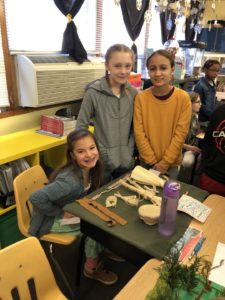
Students visiting the 2/3 grade class!
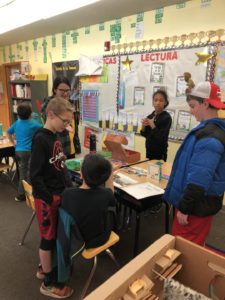
The 2/3 grade class did such a wonderful job for their Native American research project.
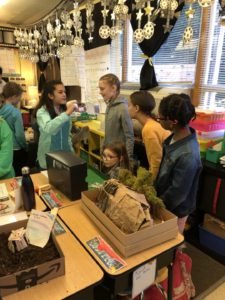
Ciencias
Nutrient Systems – Plant Nutrition
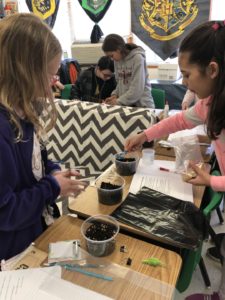
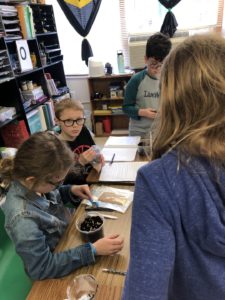
Students thought about how to break the dormancy of another organism, the wheat plant. They planted wheat seeds in containers of soil and placed half of the planters in a lighted environment and the other half in a dark environment. Students read about the action of chlorophyll and its role in the manufacture of sugar. Based on previous investigations and their background knowledge, they made an hypothesis about what will happen to the seeds. Students will be observing, monitoring and documenting their their wheat plants development.
Art with Ms. Kelli
Basket Making
Goals:
- Learn how to measure, cut, and assemble a basket framework
- Use natural reed and yarn to weave a basket
- Add decorative beads
The students made a variety of beautiful, creative baskets which are on the top shelf in the 1st Grade classroom. We’re saving these for their Art Display at graduation in June.
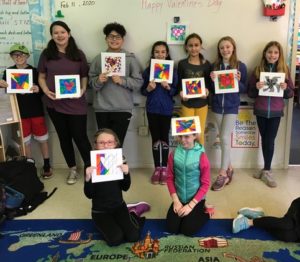 Pop-art Valentine cards
Pop-art Valentine cards
The students used markers to create a fun heart design similar to their foil hearts on their classroom bulletin board.
Weaving
Goals:
- Learn weaving vocabulary: loom, warp threads, weft threads
- Create a small woven wall hanging
- This project uses similar skills as basket weaving and the students are creating some beautiful weavings which will be on display next week!
Music with Ms. Nadia
Happy February! What better way to celebrate than by learning about Romantic composer Felix Mendelssohn and his symphonic accompiament to William Shakespeare’s Midsummer Night’s Dream?!
As music prodigy compared to Mozart, Mendelssohn wrote the overture for this famous play at 17 years old. The rest of the orchestration came later in his 30’s, a few years before his passing. We first listened to the overture while drawing our own stories following the emotions of the score. Stories included a chasing cat, a friendly ghost, and a chicken skiing. (Listen to the overture at home and see what stories you can come up with!) The story is in fact about fairies, magic flower potions, mistaken identity, and love triangles, which we learned through a short video summarizing the whole play. Perhaps the most famous song from Midsummer is the Wedding March. While we listened to it, the class was split into two teams and challenged to create wedding dresses out of toilet paper. (Enjoy this video this memorable moment: https://youtu.be/OTdva-aU5A8) This past week, we learned about the scherzo, which is a vigorous, light, and playful movement. While we listened, students took turns acting out scenes from the play in a game of charades telephone. It was hilarious!
This month in recorder, we continued honing sight-reading skills, discovered more about sixteen notes, and learned two more notes (high C and high D). Other highlights include hangman, meter re-designation (taking a music piece in 3/4 time and turning into 4/4 time by moving the bar-line), and dancing like lions and walls.
by Ivary & Paola | Feb 22, 2020 | 4th/5th Grade News
History & Geography
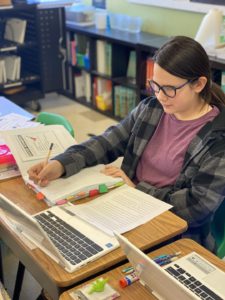 This week we began learning about England in the Golden Age. Our objectives were to:
This week we began learning about England in the Golden Age. Our objectives were to:
- Identify Henry VIII as the king who started the Church of England because he wanted to remarry and have a male heir.
- Explain why Elizabeth I became queen, following Mary I’s death
- Describe how Elizabeth I kept peace between the Catholics and Protestants in England
- learn about William Shakespeare and begin reading an abridged version of A Midsummer Night’s Dream
We will be heading to the Wells Fargo Museum on Friday March 6th! This is a preview for what we will be studying during our US History chapters. We will be meeting at the museum at 9:45. There is only street parking available around the museum so it’ll be best to carpool. Our tour/ activities start at 10:00 am and will continue until 11:15. There will then be time for questions before we head back to the school. There is unfortunately no place for us to eat lunch at the museum. Mtra.Paola has agreed to let students eat lunch during class in the afternoon if we run out of time.
If you have any questions please let me know!
Mathematics
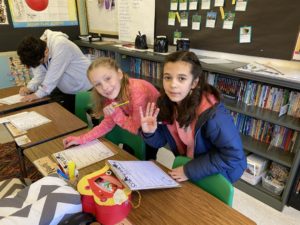 This week we began learning about Decimals. Our objectives were:
This week we began learning about Decimals. Our objectives were:
- read and write decimals to the thousandths place in standard, written, and expanded form
- compare decimals using a place value chart
- order decimals from least to greatest, or greatest to least
- we also completed our first Unlock Challenge by unlocking the math love for Valentine’s Day!
Lectura
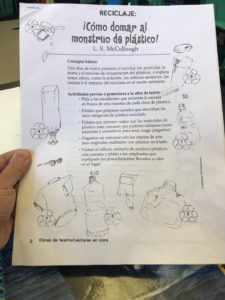
Our class started working on a fun fun project!
This week in Lectura, we continued to review the objectives for this unit, answered questions and got ready for our unit assessment next week. Students took home our review packets to study over the weekend. Please make sure they bring them back on Monday.
We are in the final stages of our persuasive writing assignment. We will be ready to publish our pieces next week.
Ciencias
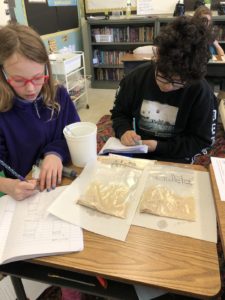
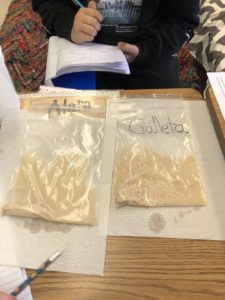
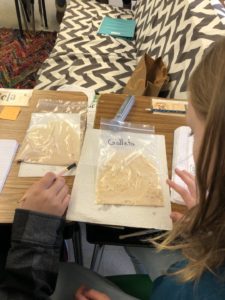
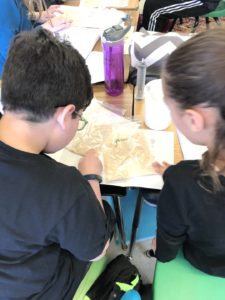
This in science our focus questions were: What are the conditions an organism need in order to survive and perform the functions of life? What does yeast need to break its dormancy? Students designed an investigation to determine the necessary conditions for activating dry yeast. After determining that warm water and a cookie produce yeast activity, they conducted an experiment to discover that it is the sugar in the cookie that activates the yeast. Yeast was introduced as a single-celled fungus.
by Ivary & Paola | Feb 15, 2020 | 4th/5th Grade News
History & Geography
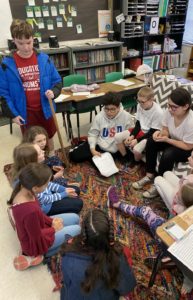 This week we wrapped up our unit on The Reformation, next week we will begin The Golden Age. Our objectives were:
This week we wrapped up our unit on The Reformation, next week we will begin The Golden Age. Our objectives were:
- Describe the causes and effects of the Catholic Church’s attempt to reform itself
- Explain how Ignatius of Loyola and the Jesuits, the Council of Trent, and the Index of Forbidden
Books contributed to the Counter-Reformation.
- demonstrate understanding of important people and events of The Reformation on the chapter test
We have been working on building our classroom community by having Morning Meetings. These are student led meetings, students begin by discussing this week´s community goals (this week we worked on including everyone in classroom discussions), we will then do a quick greeting, have some sharing time, and finally we complete an activity. Our class has done a great job of keeping our goals in mind throughout the week and working together during our Morning Meetings.
Mathematics
We also wrapped up our math unit on Ratios this week. Our objectives were:
- complete real world problems with 2- and 3- quantity ratios
- review using CUBES to complete real world problems
- demonstrate understanding and mastery of ratios on the chapter test
We also had a great time on the 100th day of school completing an escape room! We will be celebrating Valentine´s Day on Tuesday, students are welcome to bring decorate boxes to collect Valentines.
Lectura
Essential Question: ¿Que es una comunidad?We are beginning to wrap up our literacy unit, La energia en accion. This week students received a review packet of the spelling and grammar concepts seen this unit. We will continue to review these concepts next week, as we get ready for our assessment the week on the 24th of February.
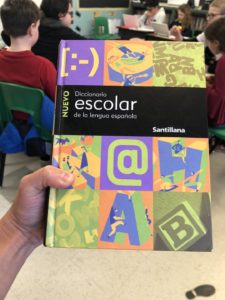
During this unit we have been doing a lot of work with spelling and vocabulary. Students are using dictionaries on a regular basis to increment their knowledge and understanding of words. If you haven’t done it yet, consider getting a dictionary of definitions in Spanish. This is a great resource to help your children develop their Spanish.
This week we continued to work on our persuasive writing. Students have done a remarkable job during this project and I am so excited to see the product of the hard work.
Objectives for persuasive report:
- Gather ideas for their persuasive report.
- Organize their ideas using an outline.
- Draft their persuasive reports.
Ciencias
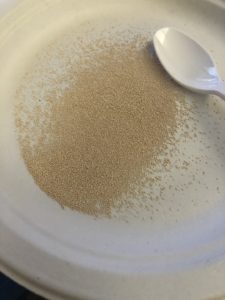 Nutrient Systems: Yeast Nutrition
Nutrient Systems: Yeast Nutrition
Students will be investigating nutrient systems of yeast, plants, and animals. Students will design an investigation to determine the necessary conditions for activating dry yeast. Yeast is introduced as a single-celled fungus.
by Sarah Segall | Feb 9, 2020 | 2nd/3rd Grade News, 4th/5th Grade News, First Grade News, In The Loop, Kindergarten News, Preschool

Families like to know what the plan is for their child’s class. We have mapped out a 5-year plan to help with this.
5-Year Plan SWS
by Ivary & Paola | Feb 8, 2020 | 4th/5th Grade News
History & Geography
This week we continued learning about the Reformation. Our objectives were:
- understand who Martin Luther was, what reforms he wanted and why
- understand the role of the Catholic Church during the Reformation
- compare the reforms made to the Catholic church and the scientific community
- learn about Copernicus’ and Galileo’s role in the Reformation
Mathematics
This week we continued working with Ratios. Our objectives were:
- compare three quantities with ratios
- find the simplest form of 3 quantity ratios
- find equivalent 3 quantity ratios
- continue using CUBES to complete word problems
We also had our first Math Meeting this week! Math Meetings are times for our students to review topics already covered in class. They will reinforce past chapters and fill any gaps in their knowledge. Students will meet with either me or Ms.Laura once a week for these Math Meetings.
Lectura
This week we finished reading the expository text: El viento en acción. Students used evidence from the text to provide answers to comprehension questions as well as express their personal opinions about renewable and non-renewable energy. We had a fantastic discussion! Our objectives included:
- Apply reading comprehension skills and strategies as they read the selection: summarizing, clarifying, asking questions,
- Identify and provide examples of cause and effect situations.
- Understand the spelling patterns of words with z.
- Understand the use of possessive adjectives and possessive pronouns in context.
- Learn how to paraphrase text.
- Use the information gathered, accurately organize it into categories.
- Cross-check different sources of information.
Objectives for persuasive report:
- Gather ideas for their persuasive report.
- Organize their ideas using an outline.
- Draft their persuasive reports.
- Apply writing conventions.
Ciencias
What happens when compost worms interact with organic matter?
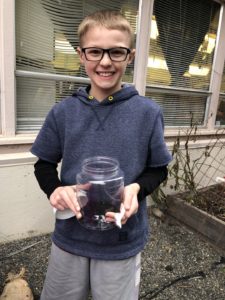
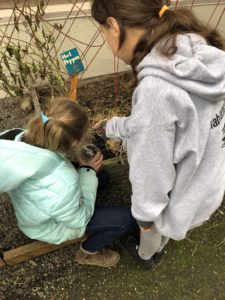
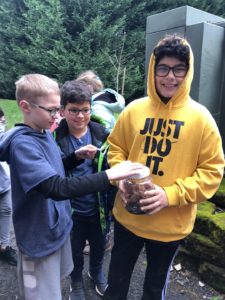
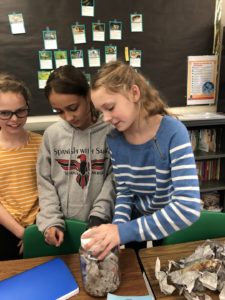

Working in groups, students set up a redworm habitat system to study detritivores. They recorded what organic materials went into the habitat with redworms. Students made predictions about what changes they will observe in our habitats over time. We will be observing and recording changes in the worm jar over 1–2 months.
- A system is a collection of interacting parts, ideas, and/or procedures that together define a physical entity or process.
- A subsystem is a small system that is inside a larger system.
- Earth can be described as the interaction of four earth systems: the rocky part (the geosphere), the atmosphere, the water (hydrosphere), and the complexity of living organisms (the biosphere).
- Food webs are subsystems within ecosystems. They describe the transfer of matter and energy within the system.
This week students took home a science book. They are expected to read the book multiple times at home and come prepared on Monday to participate in a book discussion/activity.
by Ivary & Paola | Feb 1, 2020 | 4th/5th Grade News
History & Geography
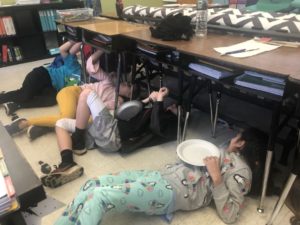 This week we finished out unit on the Renaissance and began our new unit The Reformation. Our objectives were:
This week we finished out unit on the Renaissance and began our new unit The Reformation. Our objectives were:
- find out what it might have felt like for Michelangelo to paint the Sistine Chapel by painting on our backs!
- complete the unit test as a class discussing each question to refresh our memories
- understand how the invention of the printing press affected Europe during the Renaissance and even changed our lives today
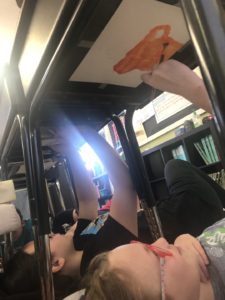 compare inventions from today (like the internet, telephones, and TV) to the printing press
compare inventions from today (like the internet, telephones, and TV) to the printing press
Mathematics
This week we continued working with Ratios. Our objectives were:
- use CUBES (circle, underline, box, evaluate and eliminate, solve and check) to complete word problems about ratios
- change ratios into fractions and fractions into ratios
Lectura
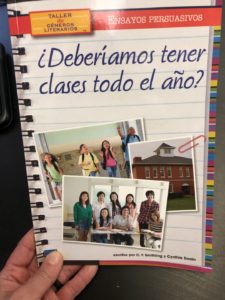
This week we started a new writing assignment: Ensayos persuasivos. To get familiar with the main objectives of this project, we have been conducting weekly class debates. Students have been learning about identifying the purpose and the audience for this project. This week we also talked about the elements and organization of a persuasive argument and the persuasive techniques such as word choice, repetition, emotional appeal, etc. Please take the time to talk to your child about this interesting piece, Deberíamos tener clases todo el ano?, and possibly have a family conversation around this topic! The objectives this week included:
- State a viewpoint and support it with facts, examples, explanations, and expert opinions.
- Establish purposes, audiences and the need for different genres.
- Accurately and meaningfully, identify and explain cause and effect situations that are directly connected to our argumentative writing studies.
- Understand the spelling patterns and semantics of homophones with c. Use these words in different contexts.
- Apply knowledge of the use of capitalization and proper punctuation.
- Understand the use of pronouns in context (demonstrative pronouns and possessive pronouns in particular)
- Learn how to paraphrase text.
- Using the information gathered, accurately organize it into categories.
- Cross-check different sources of information.
Ciencias
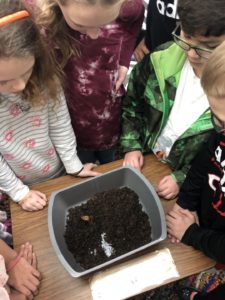
Students taking a closer look at our decomposers!
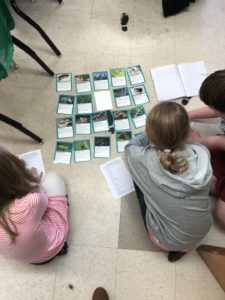 Students explored Earth as a system. Through video, we learned about four subsystems of planet Earth—the geosphere, atmosphere, hydrosphere, and biosphere. After watching the video, students answered questions and summarized the main concepts presented. We focused particularly on the biosphere and described ecosystems by looking at feeding relationships and energy transfers, described as food webs.
Students explored Earth as a system. Through video, we learned about four subsystems of planet Earth—the geosphere, atmosphere, hydrosphere, and biosphere. After watching the video, students answered questions and summarized the main concepts presented. We focused particularly on the biosphere and described ecosystems by looking at feeding relationships and energy transfers, described as food webs.
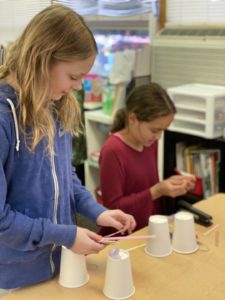 Character Education
Character Education
To continue our Perseverance theme, students were given a supply of materials and asked to invent a device that launched a pom pom into the air. There further it traveled the better! The idea was for them to make several attempts, to persevere through failed attempts and to continue to tweak their device to make it better.
Art with Ms. Kelly
Portraits
Every year I like to have the students work on a portrait project. The goals are:
- Observe shapes of faces
- Observe placement of eyes, nose, mouth
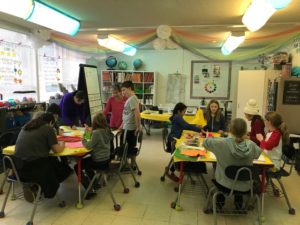
- Observe hair color and texture, and width of shoulders
- Look at reproductions of famous portraits such as Leonardo’s “Mona Lisa”, Paul Klee’s “Senecio,” and Picasso’s self portraits
The 4th and 5th Grade class worked on both a realistic portrait and also created a variety of abstract portraits using different materials including pipe cleaners and wire. Their wonderful realistic portraits are on the bulletin board at school, and we have several of their fun abstract portraits in their portfolios at school. Great job everyone!
In February we’re going to start a basket weaving project!
Music with Ms. Nadia
This month we experienced Modest Mussorgsky’s Pictures at an Exhibition. Originally a piano suite, this tribute to Viktor Hartmann’s collection of paintings was later turned into an orchestral symphony by Maurice Ravel. In other words, someone’s life inspired paintings, which inspired a piano suite, which inspired a symphony—which inspired us to create more art! We sketched our impressions of Gnomus, stretched to The Old Castle, walked around to the various Promenades, played Two Truths and a Lie to The Tuileries Gardens and Bydlo, drew portraits of Samuel Goldenberg and Schmulye (and compared our drawings to the real ones!), and both drew renderings of and danced an interpretive dance to Ballet of the Chickens in their Shells. In listening to both piano and orchestral versions, we determined that there are some songs we like better on piano and vis versa. Because he considered himself to be a realist, Mussorgsky’s music focused on how he perceived the world. This emotion translates different when played by multiple instruments vs a soloist. We learned about contrasts while comparing his busy and bustling movement Marketplace to his slow and sad Catacombs. Further contrasts can be heard when comparing the two different versions—the energetic keys to the shrill flutes and the slow dirge of the piano to the ominous horns. These contrasts can be seen in our everyday life, too! Life is fast and slow, happy and sad, light and dark—not just one thing all the time. And thus, life which inspired art which inspired art which inspired art inspires us to make art and look at life a little differently.
We have also been honing our recorder skills through sight-reading. As a class, we know notes B A G E D (or bagel with a “d” instead of an “l”), and have learned songs such as Hot Cross Buns, Snow is Falling, and Why Does Boo Scare You? Students also learned the difference between staccato and legato, and can play quarter notes, eighth notes, half notes, and whole notes. Look at them go!
by Ivary & Paola | Jan 25, 2020 | 4th/5th Grade News
History & Geography
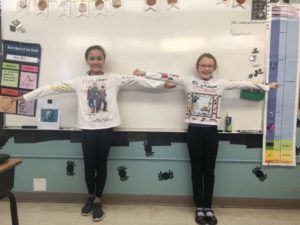
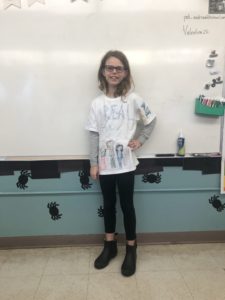
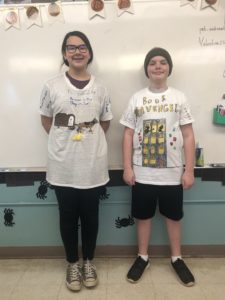 This week we continued learning about the Renaissance. Our objectives were:
This week we continued learning about the Renaissance. Our objectives were:
- review vocabulary from past chapters
- begin reading the chapter Two How-To Men
Next Monday we will be painting! We will use washable paint but please send your student in clothes that can get dirty just in case.
Mathematics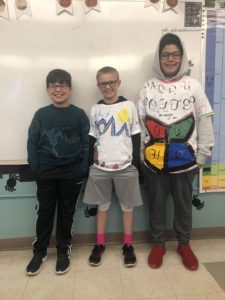
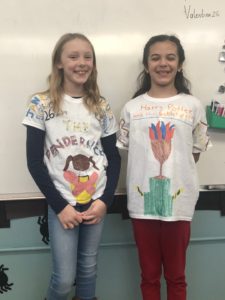
This week we began learning about Ratios. Our objectives were:
- use ratios to compare two things
- understand that you do not need the actual amount of items to create the ratio
- find the simplest ratio using the greatest common factor
- find missing terms using multiplication or division
Lectura
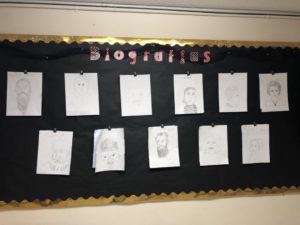
Congratulations to all our students for successfully completing our Biographies project. make sure you atop by our bulletin board to see their work.
Our objectives for this week in Spanish literacy included:
- Apply reading comprehension skills and strategies as they read the selection: summarizing, clarifying, asking questions, identifying cause and effect situations.
- Understand the spelling patterns of homophones with s.
- Understand the use of pronouns in context (demonstrative pronouns and possessive pronouns in particular)
- Learn how to paraphrase text.
- Using the information gathered, accurately organize it into categories.
- Cross-check different sources of information.
Ciencias
Students were introduced to a system as a collection of interacting parts that work together to make a whole or produce an action. They are presented with a common device and identify all the elements that go together to make that system. Students described other systems and subsystems.
- A system is a collection of interacting parts, ideas, and/or procedures that together define a physical entity or process.
- A subsystem is a small system that is inside a larger system.
- Earth can be described as the interaction of four earth systems: the rocky part (the geosphere), the atmosphere, the water (hydrosphere), and the complexity of living organisms (the biosphere).
- Food webs are subsystems within ecosystems. They describe the transfer of matter and energy within the system.

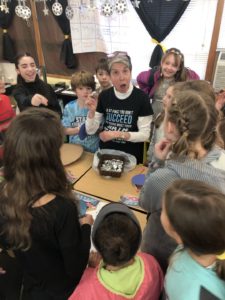
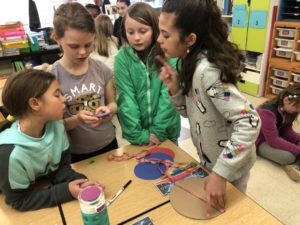
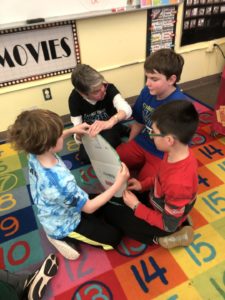
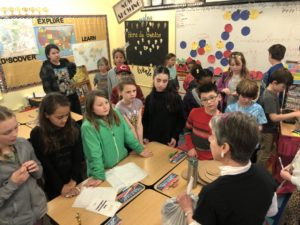

































 Pop-art Valentine cards
Pop-art Valentine cards




















 Character Education
Character Education





